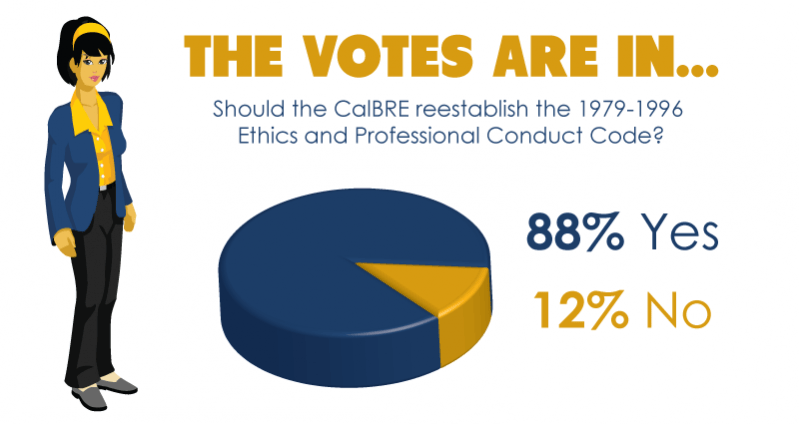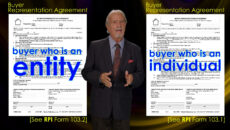The people have spoken and they want the California Bureau of Real Estate (CalBRE) to reestablish the Ethics and Professional Conduct Code from 1979-1996.
In a recent poll, 88% of voters said the Code of Ethics needs to be reinstated, a majority opinion held by our readers for several years. A 2012 poll yielded similar results with 81% voting for reestablishment of the Code.
Now, support for the Code of Ethics appears even stronger, perhaps signaling a perceived greater need for the CalBRE to adopt and enforce ethical standards for California’s real estate industry.
What is the Code of Ethics?
In 1979, the CalBRE — then the Department of Real Estate — adopted Regulation 2785, known as the Ethics and Professional Conduct Code. The Code established a set of rules for proper conduct by real estate licensees, which covered:
- unlawful conduct, related to fraud and dishonest acts prohibited by law;
- unethical conduct, acts licensees are advised to avoid to maintain a high level of professional integrity; and
- beneficial conduct, regarding practices licensees are encouraged to follow in the best interest of licensees and the public.
By enforcing a standard mode of conduct and ethics, the CalBRE aimed to better protect members of the public and improve the poor public image of real estate professionals, which had been diminished by unregulated and unethical business practices in the industry.
The Code of Ethics maintained its presence for nearly two decades, before its repeal in 1996 under Governor Pete Wilson’s Regulatory Reform Project — a spate of legislation that loosened governmental regulations in California.
The need for CalBRE guidance
While California law still regulates the conduct of real estate agents and brokers, the CalBRE no longer enforces its own code of conduct to standardize and encourage ethical practices within the industry.
Opponents of reestablishing the Code of Ethics contend existing California statutes are sufficient, precluding the need for the CalBRE to enforce ethical standards. Some also cite the trade union’s independent Code of Ethics as an adequate alternative to state-endorsed standards.
However, ethical guidelines suggested by the California Association of Realtor (CAR) only apply to those real estate licensees who are members of the trade union, not to all real estate professionals in California. This responsibility lies with the state.
It is the purpose of regulatory agencies to communicate and enforce state law to the professionals it controls. Legal code is notorious for its dense, esoteric language, making it difficult for real estate licensees to easily and fully comprehend the rules controlling their profession.
Further, a CalBRE code of ethics provides more than just legal interpretation, but also establishes recommended business practices that improve real estate transactions throughout California.
Today’s real estate professionals need this guidance from the CalBRE. Licensees and their clients alike will benefit from a transparent, accessible code of ethics that establish high standards for agents and brokers.
A practical source of proper conduct will help maintain professional integrity within the industry and hold licensees accountable to members of the public who depend on licensees to guide them through one of the most significant purchases of their lives.














